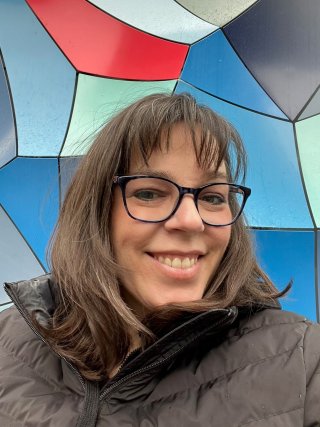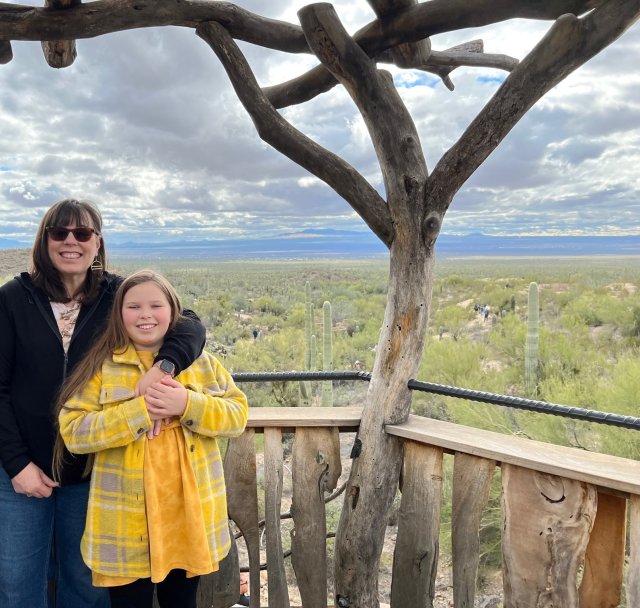Meet EPA Geologist Stephanie Ross

Stephanie Ross is the Region 5 Superfund and Technology Liaison (STL) for EPA’s Office of Research and Development. After seven years as a consulting hydrogeologist, Stephanie joined EPA15 years ago, interning at Region 5, Region 8, and EPA Headquarters, and managing brownfields, land revitalization and Superfund cleanup projects. Stephanie holds a bachelor’s degree in geosciences and a master’s degree in hydrology from the University of Arizona. She is a member of the Region 5 PFAS workgroup and the EPA Groundwater Forum. Stephanie has a fourth grader obsessed with video games and likes to drag her out of the house on hikes, photo excursions, and Girl Scouting adventures in her spare time.
Tell us about your background.
I am a hydrogeologist and former Regional Program Manager from EPA’s Region 5 office. I came to EPA after consulting to work in the Brownfields program and eventually made the transfer to remedial. I live with my 10-year-old daughter Eva and our cat Joule in the suburbs of Chicago. I enjoy spending as much time as possible outside, but since I grew up in Arizona, I’m a bit of a fair weather fan.
When did you first know you wanted to be a scientist?
I have known that I wanted to be a scientist since I was a kid. My dad would take us out to look at stars and take us hiking to look for geodes or other good rocks on the weekends. Science has always been fun for me.
How does your science matter?
I used to say I’m cleaning up the country one well at a time. Work that we do at EPA has real and tangible results on the quality of life for residents near our projects and I like to think that being a hydrogeologist helps to make that happen.
What do you like most about your research?
Right now, I’m focused on emerging contaminants like PFAS. I like being able to be part of the team that is solving problems and creating guidance for these materials that have so many unanswered questions.
If you could have dinner with any scientist, past or present, who would it be?
I think meeting and chatting with Marie Curie would be fascinating.

If you weren’t a scientist, what would you be doing?
I would love to run a community-based non-profit. There is so much work to do in our neighborhoods and so many people with great ideas that just need a little support to do it.
If you could have one superpower, what would it be and why?
Time travel! More like Dr. Who and less like Quantum Leap – I’d like to see different eras in history (and pre-history) but the idea of taking over someone else’s life to solve a problem gives me hives. Aliens are optional.
Any advice for students considering a career in science?
Find something that makes science fun, whether it’s camping and hiking for geology, or stargazing or making smelly concoctions in the lab. There’s a science behind everything we do and still loads more to discover.
What do you think the coolest scientific discovery was and why?
Given the state of the world the last few years I’d have to say vaccinees. The sheer number of lives saved is proof enough, I think.
What do you think is our biggest scientific challenge in the next 20/50/100 years?
The western water crisis. Until people can get a better understanding of where their water comes from and how, I think development will continue to use up more water than we have coming in.
Whose work in your scientific field are you most impressed by?
I’m impressed by people who are able to effectively communicate the work that they do with people who are unfamiliar with the details. Finding a balance between the generalizations you end up making in geology and the weeds you get into with engineering is definitely a skill that I continue to try to improve.
You’re stranded on a desert island with a community of other survivors – how do you use science to survive?
I’m going to assume that we are stranded on a tropical paradise (because why not). I would likely be the person in charge of collecting resources like wood, stone, and fruit. I am really good at breaking down the big picture to understand the details necessary for implementation and I don’t mind getting my hands dirty.
Editor's Note: The opinions expressed herein are those of the researcher alone. EPA does not endorse the opinions or positions expressed.
